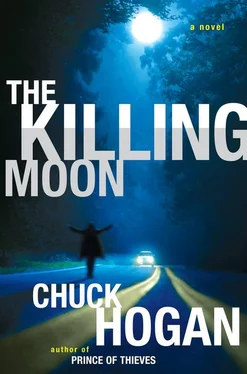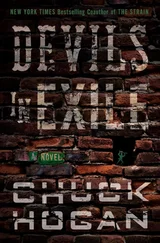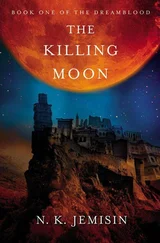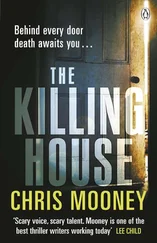Bucky said, “Maddox, you’re on parade duty. The rest of us? We got some marching to do.”
Gayle unfolded her oversized sunglasses and said to him, “Walter, please. We came for a parade.”
And she was right. Here he was snapping at his boys, taking it out on them. The parade was about to start, and why should he let the Pail brothers ruin the town holiday, such as it was?
Because that pair of no-brains had laughed at him.
Neanderthals. With their trademark Pail eyes peering out from deep inside their skulls, tramp eyes, Bucky with his oh-so-clever grin and Eddie with his toothy smile. Menaces. In any other town, those two would be pumping Walter Heavey’s gas or mowing his lawn.
Imagine if a protected species like a bald eagle or a spotted owl knew it was protected. Knew it could peck at your eyes and ears and turd on your face and there was not a damn thing you could do — because if you so much as raised a hand against it, into jail you would go. Now give that protected species loaded guns and powers of arrest.
He reached for his sons’ whiffled heads, Wallace, Walker, and Waldo, their orange fuzz bristling. If those Pails ever tried to humiliate Walter Heavey in front of his boys
“The gall of that punk, Gayle. By God. Something’s got to give.”
Her hand fell to her side, her charm bracelet and its three identical silver heads jangling as she communicated her aggravation with a sigh. “So let’s move then, Walter.”
She lobbed this bomb at him every once in a while, but she was the one who could never part with the house, having sunk so much time and energy into decorating it to her liking. But he played his part. “Move where? Where else are we going to find a house as big as ours with as much acreage as we have for what we’d get in this market? At this tax rate? Take it from a man who knows,” he said, thumbing his State Farm Insurance shirt.
Gayle put her hand on his arm, the immediacy of her grip meant to silence him.
A black ball cap and white jersey moving up the sidewalk. Dark sunglasses. A Black Falls cop coming their way.
Walter Heavey felt his wife pulling the boys back from the sidewalk’s edge. It just wasn’t right. A family shouldn’t be wary of their own police force.
It was the new cop, Don Maddox. Maddox’s hiring had been little more than a bad joke, indicative of the whole sorry state of affairs here in Black Falls. Maddox was about as qualified to be a law officer as Walter Heavey was. The POLICE jersey he wore, a pair of sunglasses: Was that all it took? If Heavey traded shirts with Maddox, would Maddox be able to draw up a whole-life policy? Would he be able to decode an actuarial table at a glance? Walter Heavey was his company’s top performer in the region, remarkable when you factored in that State Farm didn’t even offer insurance products in his home state. His region encompassed southwestern New Hampshire, southern Vermont, and eastern New York State, a customer base he had built up over the past fifteen years — fifteen years while Maddox was doing — well, what, exactly?
Maybe Maddox could put on surgical scrubs and take out Walter Heavey’s appendix while he was at it.
Pinty was the one who had helped him catch on part-time with the police — another head-scratcher. If Pinty and Maddox went back such a long way, why would Pinty drop a friend into that pit of vipers?
“What now?” said Heavey, as Maddox came up. “You come for a chuckle too?”
Behind his dark glasses, Maddox acted confused. “I heard you heard a shot last night.”
“I know, I know. You put down a deer in the road, that was the shot I heard. Only, it wasn’t. The one I heard came from the Borderlands behind my house. The other direction.”
“You remember the time, by any chance?”
“I do. It woke me up and I checked the alarm clock. Nine minutes after midnight.”
Maddox looked around as though concerned someone might overhear their conversation. The turnout for the parade wasn’t amounting to much — a combination of hot July sun and general apathy. “The shot was all you heard?”
“All I heard, that’s right.”
“No voices, no yelling?”
“Nothing. And I listened.”
“Well, the timing seems about right,” said Maddox. “This deer, it came streaking out of the Borderlands, broadsided my patrol car headfirst. Going that fast, I figure something must have spooked it.”
This took a moment to settle in: Maddox believed him.
Maddox noticed the three boys looking up from behind their mother’s shielding hips. He bent down closer to their level. “Hey, there, guys. You ready for the parade?”
The boys crowded closer as though trying to climb back inside their mother.
Maddox straightened, his smile bearing a trace of regret. “Anyway, enjoy the day, folks,” he said.
Heavey said, “You’re going to check into it?”
“I’ll take a ride out on the fire road, I guess. Beyond that, I don’t know.”
“What about the shoe prints?”
That stopped Maddox from leaving, brought him back. “What shoe prints?”
“They didn’t tell you?”
“I work just three overnights a week, Mr. Heavey. They don’t give me a whole lotta help on the shift change.”
Heavey told him briefly about the woman in black. He liked the concern he saw on Maddox’s face. Liked it very much.
“Those shoe impressions still there?” said Maddox.
“Some, sure.”
“Think you can keep your boys from trampling them? I could stop by at the beginning of my shift tonight, before it gets dark.”
Heavey was speechless. A Black Falls cop actually listening to him. Willing to act.
Parade music started up, a prerecorded band march. Maddox glanced around again, leaving Heavey with the distinct impression that Maddox did not want to be seen talking to him. All to the better.
“Just you, then,” Heavey said. “I don’t want any of those others on my property.”
They say rivers usually divide towns, but not Black Falls. The town had grown up around an east-west crook in the south-flowing Cold River, forming a natural crease between the low farmlands to the south and the foothills rising in the north. The town got its name from a pair of waterfalls just up the river, the site of a massacre — so bloody the water was said to run black — of Pequoigs in 1676, at the height of the Indian Wars. The town was not officially incorporated until 1755, the criteria being a population financially capable of building its own Congregational church and supporting its own Congregational minister. A state law in 1831 separating church from state prompted the construction of a new town meeting site, a white clapboard building renovated in the mid-1960s, now resembling a side-by-side two-family house, the town offices on one side and the police station on the other.
That building, symmetrical beneath a round attic window like an always open, always staring eye, stood at the head of the T-shaped intersection of Main and Mill. Main Street represented the top bar of the T, accompanying Cold River in either direction. Number 8 Road, the fragment of an old Hartford-to-Montpelier mail route, shot northward from the western bar, narrowing as it snaked into the hills above town.
Mill Road ran south, being the trunk of the T, first as a low iron bridge spanning the summer-swift Cold River, then as a paved road hooking around the old Falls Paper Incorporated pulp mill, rotting on its river stilts.
About half of Black Falls’ 1,758 residents were clustered in the town center, in the old mill houses crowded along Main and Mill, crumbling brick tenements and company-built three-deckers with sagging roofs and slumping porches. The shuttering of the paper mill almost twenty years ago was largely to blame for the town’s current state of affairs. Black Falls had evolved from a trading post town in the eighteenth century to a farming town in the nineteenth century to a mill town in the twentieth. But even its proudest citizen had to admit that the twenty-first held little promise. The town wasn’t dying so much as it was disappearing. No supermarket. No traffic lights. No ATM. Mobile telephone reception was one bar at best, broadcast television reception almost nil, and the wait for cable television was currently twenty-five years and counting. As “globalization” evidently required paying customers, the modern world appeared willing to leave the town behind.
Читать дальше












